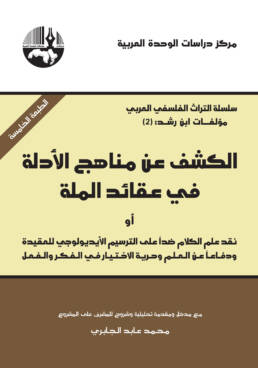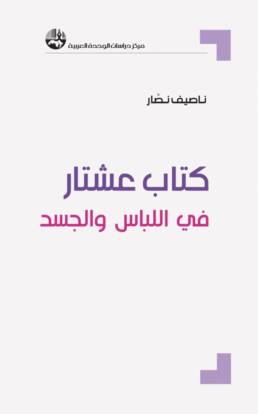Philosophical Production in Contemporary Arab Thought in the Theses of Nassif Nassar
Price range: 8 $ through 16 $
Price range: 8 $ through 13 $
AuthorAbdel-Wahed Ayat El-ZeinDate15/6/2020No. of Pages320EditionfirstISBN9789953829067E-ISBN9786144981672
| Weight | 0,49 kg |
|---|---|
| Dimensions | 24 × 17 cm |
| Product Type | Electronic, Paper |
The Center for Arab Unity Studies published the book “Philosophical Production: On Contemporary Arab Thought in Nassif Nassar’s Theses”, by Dr. Abdel Wahid Ait El Zein.
Is it not time yet to enter the path of “The Orphan Experience”? Has Arab thought met the expectations of its founding fathers? Why did the idea of “patriarchy”, which devoured every aspect of human life, go beyond the duty of reverence to the “father” figure, and subjected him to a violent transformation that turned him into a tyrant? A terrible patriarchy which took over the whole of Arab consciousness, as if it were born as an elderly man: How can one be possibly born old at the beginning of their own life?
The aforementioned questions guide the reader towards an explicit understanding of what “philosophical creativity” is, the conventional requirements of Arab philosophical thinking, and the conclusions in Nassar’s theses on this matter – particularly the links established with medieval Islamic philosophy on the one hand, and Western philosophy on the other hand. In the attempt of seeking the elements of the standard method of reading, attention is brought to one of the requirements of mastering the method of critical analytical reading, revealing how the majority of philosophical works are blindly abiding to it. The reader is then asked to pay close attention to the works of Muhammad Abid al-Jabri, Taha Abdul Rahman, Nasif Nassar, and Fathi Al-Maskini, etc, to question their perceptions on the limits and capabilities of “contemporary Arab philosophy”, and to notice how texts obsessively subject to “a model” of reading that is meant to provide guidance and direction in critical analytical thinking. The book is an attempt to explain the ambiguities and paradoxes of contemporary Arab thought on the basis of a systematic assumption which is provided in Nassar’s thesis titled “The Philosophy of Presence”. His work was of great significance for making the first steps towards liberating Arab philosophical thought.
The book includes four chapters, an introduction, a conclusion, a list of references and an index.
Add a review
You must be logged in to post a review.
You May Also Like
Cultural Power and Political Power
Price range: 10 $ through 13 $
Exposition of the Methods of Demonstration Relative to the Dogmas of Religion
Price range: 5 $ through 8 $
The Book of Ishtar: on Dress and the Body
Price range: 7 $ through 11 $
The Question of Justice in Current Political Philosophy
Price range: 7 $ through 11 $
Vladimir Jankélévitch: Ethical Hearing through an Aesthetic Counseling
Price range: 6 $ through 10 $
Comprehending the Judicious Qur’an: A Clear Exegesis According to the Sequence of Revelation (Part Three)
Price range: 10 $ through 12 $








